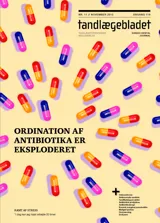Introduction - Antiresorptive therapies effectively reduce the incidence of skeletal fractures and bone pain in patients with metastatic bone cancer and multiple myeloma. Patients in high dose antiresorptive treatment are at high risk of developing osteonecrosis of the jaws (ONJ) after tooth extraction. Presently, the antiresorptive treatment is discontinued in relation to the tooth extraction, known as drug holiday – even though it is unknown whether a drug holiday plays a role for the development of ONJ after tooth extraction with primary mucosal cover. The purpose of this article is to clarify the importance of a high dose antiresorptive drug holiday in relation to tooth extraction for the development of ONJ.
Methods – Keywords and search were made in collaboration with Copenhagen Trial Unit and included literature in all relevant scientific databases. Review of the literature – We did not find any trials or systematic reviews, testing whether antiresorptive drug holiday could reduce the development of ONJ in relation to tooth extraction in cancer patients at high dose antiresorptive treatment.
Conclusion – At present there is no evidence for or against the use of a high-dose antiresorptive drug holiday in relation to tooth extraction with primary mucosal cover for the development of ONJ.


